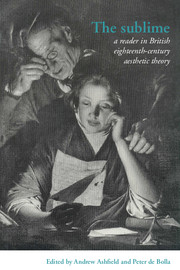Book contents
- Frontmatter
- Contents
- List of Abbreviations
- Introduction
- Part I The Longinian tradition
- Part II Rhapsody to rhetoric
- Part III Irish Perspectives
- 25 A philosophical enquiry into the origin of our ideas of the sublime and beautiful (1759)
- 26 Lectures concerning oratory (1758)
- 27 Clio; or a discourse on taste (1769)
- Part IV The Aberdonian Enlightenment
- Part V Edinburgh and Glasgow
- Part VI From the Picturesque to the Political
- Sources and further reading
25 - A philosophical enquiry into the origin of our ideas of the sublime and beautiful (1759)
Published online by Cambridge University Press: 05 June 2012
- Frontmatter
- Contents
- List of Abbreviations
- Introduction
- Part I The Longinian tradition
- Part II Rhapsody to rhetoric
- Part III Irish Perspectives
- 25 A philosophical enquiry into the origin of our ideas of the sublime and beautiful (1759)
- 26 Lectures concerning oratory (1758)
- 27 Clio; or a discourse on taste (1769)
- Part IV The Aberdonian Enlightenment
- Part V Edinburgh and Glasgow
- Part VI From the Picturesque to the Political
- Sources and further reading
Summary
Part One. Section VII
Of the sublime
Whatever is fitted in any sort to excite the ideas of pain, and danger, that is to say, whatever is in any sort terrible, or is conversant about terrible objects, or operates in a manner analogous to terror, is a source of the sublime; that is, it is productive of the strongest emotion which the mind is capable of feeling. I say the strongest emotion, because I am satisfied the ideas of pain are much more powerful than those which enter on the part of pleasure. Without all doubt, the torments which we may be made to suffer, are much greater in their effect on the body and mind, than any pleasures which the most learned voluptuary could suggest, or than the liveliest imagination, and the most sound and exquisitely sensible body could enjoy. Nay I am in great doubt, whether any man could be found who would earn a life of the most perfect satisfaction, at the price of ending it in the torments, which justice inflicted in a few hours on the late unfortunate regicide in France. But as pain is stronger in its operation than pleasure, so death is in general a much more affecting idea than pain; because there are very few pains, however exquisite, which are not preferred to death; nay, what generally makes pain itself, if I may say so, more painful, is, that it is considered as an emissary of this king of terrors.
- Type
- Chapter
- Information
- The SublimeA Reader in British Eighteenth-Century Aesthetic Theory, pp. 131 - 143Publisher: Cambridge University PressPrint publication year: 1996
- 6
- Cited by



